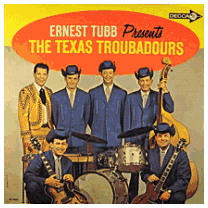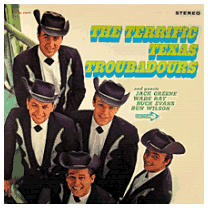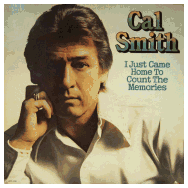![]() Cal Smith (ne Calvin Grant Shofner, 1932-2013), not to be confused with honkytonk legend Carl Smith, was a notable also-ran of the classic country era... Born in Oklahoma, Smith started his career in the SF Bay Area, Smith performed sporadically throughout the 1950s, and only really launched his professional career in the early '60s, when Ernest Tubb offered him a job as the guitarist for his Texas Troubadours band, a gig he kept for nearly a decade while also pursuing a path as a solo singing star. In some ways, Smith's career parallels that of Mel Tillis, another journeyman country artist who was also originally signed to Kapp Records but couldn't quite make things click during the 'Sixties. Like Tillis, he finally hit the big time in the early '70s after signing with Decca Records, and found their bright, punchy in-house production style to be a good frame for his modest talents. Smith never made it quite as far as Tillis, but he did rack up three chart-topping singles -- "The Lord Knows I'm Drinking," "Country Bumpkin," and "It's Time To Pay The Fiddler" -- before starting to slide back into the far end of the charts. Here's a quick look at his work...
Cal Smith (ne Calvin Grant Shofner, 1932-2013), not to be confused with honkytonk legend Carl Smith, was a notable also-ran of the classic country era... Born in Oklahoma, Smith started his career in the SF Bay Area, Smith performed sporadically throughout the 1950s, and only really launched his professional career in the early '60s, when Ernest Tubb offered him a job as the guitarist for his Texas Troubadours band, a gig he kept for nearly a decade while also pursuing a path as a solo singing star. In some ways, Smith's career parallels that of Mel Tillis, another journeyman country artist who was also originally signed to Kapp Records but couldn't quite make things click during the 'Sixties. Like Tillis, he finally hit the big time in the early '70s after signing with Decca Records, and found their bright, punchy in-house production style to be a good frame for his modest talents. Smith never made it quite as far as Tillis, but he did rack up three chart-topping singles -- "The Lord Knows I'm Drinking," "Country Bumpkin," and "It's Time To Pay The Fiddler" -- before starting to slide back into the far end of the charts. Here's a quick look at his work...
 The Texas Troubadours "Ernest Tubb Presents..." (Decca Records, 1964) (LP)
The Texas Troubadours "Ernest Tubb Presents..." (Decca Records, 1964) (LP)
(Produced by Owen Bradley)
Cal Smith was hired as a member of Ernest Tubb's backing band in 1961, and performed on each of their four Decca albums. He played guitar and was frequently featured as a solo singer (both on record and on stage) sharing the spotlight with Jack Greene (who played drums) and bandleader Leon Rhodes, whose propulsive lead guitar gave the band some real country kick. On this album, Smith sings "I'll Have Another Cup Of Coffee," while Jack Greene sings "The Last Letter."
![]() The Texas Troubadours "Country Dance Time" (Decca Records, 1965) (LP)
The Texas Troubadours "Country Dance Time" (Decca Records, 1965) (LP)
(Produced by Owen Bradley)
On this album, Smith sings three songs: a cover of Jack Guthrie's "Oklahoma Hills" and "Honky Tonks And You," and Jack Green sings "Another Bridge To Burn" and "What About Me."
![]() The Texas Troubadours "Ernest Tubb's Fabulous Texas Troubadours" (Decca Records, 1966) (LP)
The Texas Troubadours "Ernest Tubb's Fabulous Texas Troubadours" (Decca Records, 1966) (LP)
(Produced by Owen Bradley)
Cal Smith songs on "I'm A Sad And Lonely Man," while Jack Greene croons "Afraid To Care..."
 The Texas Troubadours "The Terrific Texas Troubadours" (Decca Records, 1966) (LP)
The Texas Troubadours "The Terrific Texas Troubadours" (Decca Records, 1966) (LP)
(Produced by Owen Bradley)
This was the last "solo" Troubadours album for the Decca label... Cal Smith was still in the band though he doesn't sing on this one, just plays guitar. Meanwhile, Jack Greene had finally launched his solo career, and is listed as a guest performer, along with Wade Ray, Buck Evans and Bun Wilson. The band itself shows remarkable verve and versatility compared to the Ernest Tubb albums of the same era, with some poppy flair and even a hint of western swing. Fun stuff; not all the guest vocalists take their songs seriously though -- there are some straight-up ballads, though also a couple of tracks where they're just goofing around. It's okay, though -- the lighthearted mood matches the band's peppy, melodic performance.
Cal Smith "All The World Is Lonely Now" (Kapp Records, 1966) (LP)
Cal Smith "Goin' To Cal's Place" (Kapp Records, 1967) (LP)
The album's title is a reference to the 1967 Buck Owens hit, "Sam's Place," which Smith covers along with various heart songs and honkytonk tunes. Indeed, the Buck Owens-Bakersfield Sound figures prominently on this album, with a certain bounce and brightness to the production... Smith sings some pretty gloomy songs, but always with a smile on his face. But even if Buck is the most overt influence, who I'm most often reminded of here is Merle Haggard, the other pillar of the Bakersfield Sound, with Smith taking a fairly serious, reflective tone on many of the slower numbers. At any rate, for an album coming out of late '60s Nashville, this is a pretty roots-oriented record... Nice one!
![]() Cal Smith "Travelin' Man" (Kapp Records, 1968) (LP)
Cal Smith "Travelin' Man" (Kapp Records, 1968) (LP)
(Produced by Paul Cohen)
Smith was still in the Troubadours when this album came out, though I'm not sure if they were backing him on this album for a rival label -- no liner notes to indicate either way. Anyway, it's nice stuff. More amiable, low-key, softened-down honkytonk, with reasonably vigorous, stripped-down arrangements, and while there isn't much "bite" to the music, the songs are all pretty good, and Smith croons through the material without sounding as maudlin or bored as folks at, say, RCA seemed to be with their sessions. And there are some great songs on here, notably the heartsongs like "I'll Just Go On Home," the Hank Thompson-esque "I Took Her For A Fool," and the stinging alcohol ballad, "You're Not Drowning The Heartache" ("...you're just teaching it to swim...") There are also some tunes from up-and-coming songwriters such as Mickey Newbury ("I Wish I Could Say Goodbye To You"), Carmol Taylor ("Did She Ask About Me") and a couple by a guy named Randall J. Colemus. All in all, a pretty strong record with confident performances and reasonably twangy picking.
Cal Smith "At Home With Cal" (Kapp Records, 1968) (LP)
Cal Smith "Drinking Champagne" (Kapp Records, 1968) (LP)
Cal Smith "...Sings It Takes Me All Night Long" (Kapp Records, 1969) (LP)
Cal Smith "Country Hit Parade" (Kapp Records, 1970) (LP)
Cal Smith "I've Found Someone Of My Own" (Decca Records, 1972) (LP)
Cal Smith "Cal Smith" (MCA Records, 1973) (LP)
Cal Smith "Country Bumpkin" (MCA Records, 1974) (LP)
Cal Smith "It's Time To Pay The Fiddler" (MCA Records, 1975) (LP)
Cal Smith "My Kind Of Country" (MCA Records, 1975)
Cal Smith "Jason's Farm" (MCA Records, 1976) (LP)
 Cal Smith "I Just Came Home To Count The Memories" (MCA Records, 1977)
Cal Smith "I Just Came Home To Count The Memories" (MCA Records, 1977)
(Produced by Walter Haynes)
This was Smith's last major-label album, a pleasant if semi-underwhelming countrypolitan set, with by-the-numbers production, but some pretty good, pretty corny songs, including the title track, which was his last Top 20 hit. Smith seemed to be channelling mid-'70s Johnny Cash on a lot of these tracks, which ain't necessarily a bad thing. He recorded several songs by Don Wayne, including "Son, Run To The Spring," a morbid, mama-is-dying novelty number worthy of Porter Wagoner. There are also a couple by Max D. Barnes, a spooky gospel song by Conway Twitty ("Come See About Me") and a bunch of generic stuff that's easy on the ears, even with the occasional big vocal chorus and big, swelling arrangements. Nice romantic number with "Till Then." Not a classic, but a decent record from an iffy era. At least he didn't try and "go disco," like some other folks!
Cal Smith "Turn Me Loose" (51 West Records, 1983) (LP)
Cal Smith "Stories Of Life" (Step One Records, 1986) (LP)
Cal Smith "The Best Of Cal Smith" (Kapp Records, 1971) (LP)
This belated collection of his material on Kapp Records -- put out just as he was jumping ship to Decca -- includes several tracks that hadn't come out on LP before, including mild chart hits such as "You Can't Housebreak A Tomcat" and "Heaven Is Just A Touch Away," as well as "Drinking Champagne," the only one of his Kapp singles to crack into the Top 40. Some of these songs were revived during his MCA years, when they were trying to cash in on his fame during a string of #1 singles.
 Cal Smith "The Best Of Cal Smith" (Hux Records, 2009)
Cal Smith "The Best Of Cal Smith" (Hux Records, 2009)
Cal Smith "My Kind Of Country/I Just Came Home To Count The Memories" (Hux Records, 2010)
A twofer reissue of two of his later albums on MCA, from 1975 and '77 respectively.
Cal Smith "Country Bumpkin" (Gusto Records, 2007)

